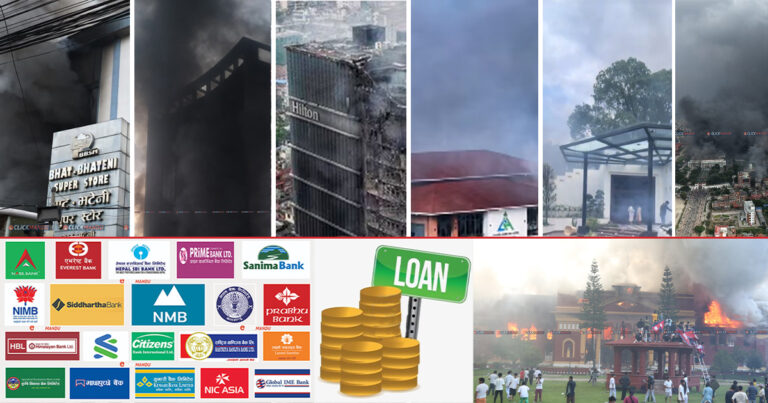Kathmandu: The violent incidents during the Gen-Z Movement on September 8 and 9 resulted in damages worth Rs 37 billion to private businesses and residences across Nepal.
Businesses that had borrowed Rs 154 billion in loan limits from banks suffered losses amounting to Rs 37 billion, according to initial assessments.
“Out of 612 borrowers who had taken loans totaling Rs 154 billion, enterprises utilizing Rs 104 billion in credit were affected by the vandalism and arson,” a source told Clickmandu. “These businesses have faced losses amounting to Rs 37 billion.”
Although 873 business owners were affected, the Nepal Rastra Bank (NRB) said that after removing overlaps in cases where multiple investors were involved in the same business, 612 individual enterprises were found to have sustained damage. Out of the Rs 37 billion loss, insurance is expected to cover around Rs 25–26 billion.
On September 9, protesters targeted several major business groups and private residences, vandalizing and setting fire to properties.
Businesses and industries financed through bank loans suffered significant losses as demonstrators attacked and burned structures during the protests. Major properties affected included the Hilton Hotel (invested by Shankar Group), Bhatbhateni Supermarket owned by Min Bahadur Gurung, CG Digital Park of Chaudhary Group, Chandragiri Cable Car and Maulakalika Cable Car (owned by Chandra Dhakal), and several automobile showrooms in Thapathali. The Central Business Park in Thapathali, which houses Kantipur Publications, also sustained heavy damage.
Residences of Binod Chaudhary at Ravi Bhawan and Shekhar Golchha were also vandalized and set on fire. Minor damage was reported at Golyan Tower, owned by the Golyan Group. In Pokhara, the home and vehicle showroom of former NADA Automobiles Association President Dhruva Thapa, and businesses of former Gandaki Province Minister Bindukumar Thapa, were also attacked.
NRB Governor Dr Bishwanath Paudel confirmed that 68 branches of banks and financial institutions across the country were damaged, along with 100 ATMs and 73 extension counters. At Rastriya Banijya Bank’s New Baneshwor branch, nearly 18 kilograms of gold kept as collateral and Rs 50 million in cash were stolen during the looting.
Bankers said that although direct losses are estimated at several billion rupees, the indirect impact is much greater. Many business owners have suspended expansion plans and loan commitments due to the destruction. Several borrowers who were previously repaying loans regularly have been unable to make even their September-end interest payments following the unrest.
Government and Central Bank announce unified relief measures
In coordination between Finance Minister Rameshore Khanal and NRB Governor Dr Bishwanath Paudel, the government announced an immediate relief package to help affected businesses recover and restore confidence.
A task force comprising three joint secretaries from the Finance Ministry, three executive directors from NRB, and one from the Insurance Board recommended the relief measures.
The government decided to provide a 50 percent customs duty exemption on imported goods needed for rebuilding damaged structures. The Insurance Board has arranged for advance claim settlements based on preliminary reports of insured losses.
NRB has allowed affected businesses to reschedule or restructure loans by mid-January 2026. It also introduced a Payroll Protection Plan to safeguard jobs of employees working in affected enterprises.
Under the plan, banks can reschedule or restructure loans of borrowers directly or indirectly affected by the protests, charging a minimum of 5 percent interest during the recovery period.
For new loans provided to restart damaged businesses, banks may charge a maximum premium of 0.5 percentage points above the base rate until operations resume. The central bank has temporarily waived the requirement to classify loans with an 80:20 capital ratio under the “watchlist” category for one year.
Furthermore, under the Payroll Protection Scheme, businesses can obtain loans through the banking system to pay employee salaries with only 0.5 percent premium over the base rate. The government will provide a 2 percent interest subsidy for up to six months or until the business resumes operations, whichever comes first.
The government also extended deadlines for income statement submissions and tax filings. The Insurance Board implemented a policy to provide 50 percent advance claim payments to insured businesses based on initial loss reports.
Bankers noted that the protests caused not only financial losses but also deep psychological impacts on the business community. As of the end of Ashoj, many borrowers have cited the Gen-Z unrest as the reason for their inability to repay loan installments.



Comment Here